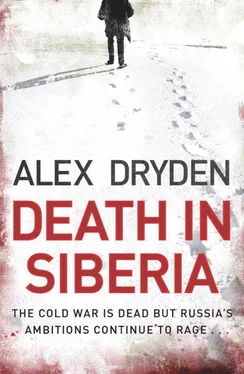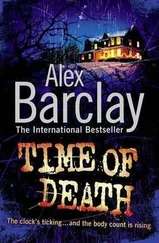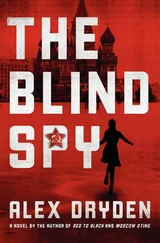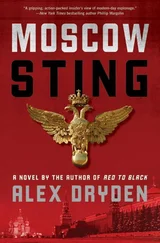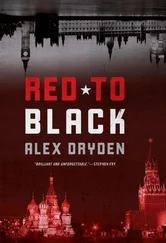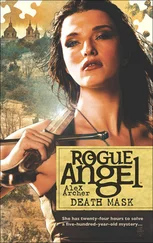Over the phone Temov reeled off the night’s events in Petrov’s quarter of the city; the new drunk-tank occupants, the knifings, the overdoses, the thieving, the accidental or not-so-accidental deaths. He sounded bored, or maybe just tired from the shift. But he had left the best until last. There had been a murder reported, Temov told him, unable to suppress some excitement in his voice. The report had come in just five minutes earlier at 5.47. The dead body was at a block not far from Petrov’s own apartment. And according to the anonymous caller, there was ‘something odd’ about the murder victim. But then the anonymous caller had rung off quickly from what was found to be a public phone. A public phone in his quarter that actually worked, Petrov noted with some surprise.
Corporal Temov suggested that he could pick up the lieutenant in a squad car and they could both go together.
‘I’ll walk,’ Petrov told him. ‘Meet me there. Seal it off.’
Petrov sat in the kitchen for a moment longer. For some reason – perhaps the old man’s imminent death – his mind turned back to his grandfather, Gannyka, dying in a reindeer-hide tent up above the Arctic Circle. He automatically looked across at the window-sill where he kept the deer-hide drum the old man had given him as a child and which he hadn’t touched in years. A magic drum, an Evenk tambour, Gannyka had told him, made from the wood of a tree struck by lightning, and then stretched with deerskin. It was made from the same tree from which Gannyka had made his own shaman’s drum, back in the 1930s. Petrov stood and walked to the window. He picked up the small drum and turned it over in his hands. Then he began to tap a rhythm that scattered the layer of dust from the drum-skin into the rays of sunlight. He decided then that he would like to see his grandfather for one last time before the old man died.
He returned to the table, finished his tea and smeared the rest of the fish mush on to another slice of black bread. He washed his hands carefully, buttoned up his jacket, put on his militsiya cap and took the urine-stained and stinking elevator to the foot of the building.
The walk itself was just a little over ten minutes away from the street exit from his block and he arrived before Temov had time to scream up in a cop car with its light flashing.
There was a small throng of people outside the chipped concrete entrance to the block. They were babas with their black shawls and shopping bags, a few very young and unwashed children, a couple of youths who stared at the ground, kicked chips of concrete, and kept their hands in their pockets.
‘Where?’ Petrov asked quietly and to the group in general.
One of the babas pointed silently behind her into the alley where the trash was kept and, mostly, left to rot.
Then Temov ran up behind him and seemed to be about to push the placid little circle of residents back as if they were fomenting a dangerous public riot. But something in his lieutenant’s quiet demeanour pre-empted his carefully learned officious arrogance.
‘Get some tape,’ Petrov told him.
Temov walked back to the car.
The block was not far from the great river’s dock area, just a street or two away from the river, in fact, in Sverdlovsk Street. It was much like Petrov’s own block, badly built of poor materials, dilapidated further by the extreme temperatures which in winter could reach minus forty-five degrees centigrade or more, and littered around its edges with the detritus of its chemically unhinged inhabitants.
He walked down the damp alley next to it. It had started to drizzle and he now wished he’d brought his coat. Down here in the dark warren of the blocks, he hadn’t even noticed the sun had disappeared.
When he reached the end, just before the overflowing trash cans blocked the path, he saw the body. It was the corpse of a man, lying face up.
Petrov knelt down beside the dead man. He studied him patiently and with care, as if he might suddenly pop back to life.
Despite the dirt on it, the body was well dressed, Petrov noted first of all, and therefore the man could not be from around here. That was certain. He peeled back the man’s upper lip. Foreign dental work, he noted. A rich Russian, then. Then he placed his right hand behind the man’s neck, between it and the concrete. There was a bullet hole, the shot fired from close up – he could feel the hole and the burn marks around it. An assassination, by the look of it. The Krasnoyarsk mafiya doing its night work. They’d shot him in the back of the neck, then left him face up away from the crime scene in someone else’s trash alley. Sometime during the night. Forensics would know when.
Petrov turned around, still kneeling, to look behind him.
For some reason that he couldn’t explain to himself, he wanted to know if he was being observed. But there was no one. All he heard was Temov’s commanding arrogance from around the corner at the far end of the alley. Now, without Petrov’s influence, all his official state aggression appeared to have been released.
Petrov turned back to the corpse. He slid his hand under the man’s raincoat and into an expensive-looking tweed jacket and took out an air ticket; it was for a seat on board the flight from Norilsk up beyond the Arctic Circle to Krasnoyarsk. It was from the previous afternoon. He then rooted further down into the pocket and brought out a passport, which was protected in a black leather wallet. He slipped it out of the wallet and looked at the cover of the passport and saw at once that it wasn’t Russian. The man was a citizen of the European Union, apparently. Then he flicked to the end page. This made him pause again. The assassin’s victim was a foreigner, that was certain. But he was also a professor. He mentally noted the name of the man, Gunther Bachman, and his country of origin, Germany. A professor? Well, in Germany everyone called themselves Herr Doktor or Herr Professor , didn’t they?’
So that was what was ‘odd’ about the corpse, he thought. A well-off foreigner in a back alley of Krasnoyarsk’s most unpleasant, filthy and poverty-stricken quarter. He put the passport back into its leather wallet and then returned it and the air ticket to the pocket of the man’s tweed jacket.
If whoever had killed Bachman had left the passport, there must be a reason. They could have got good money on the black market for it. Perhaps, then, whoever killed him didn’t have the wherewithal to deal with a foreign passport, had nowhere to fence it – that was the simplest explanation. So maybe it wasn’t a mafiya murder after all. The mafiya would know how to make good money from a European Union passport. Perhaps instead it was some opportunistic delinquent who had killed the German professor. Perhaps Bachman had been unlucky enough to wander off the beaten track, then been mugged and casually killed. A delinquent, perhaps, who imitated the style of the mafiya .
Petrov remained, squatting on his haunches by the body now. If they’d left the passport, it was surely certain they would have stolen any cash the German had in his pockets. Petrov dug around in the opposite inside pocket of the jacket and came out with a well-worn money wallet. He flicked it open and, sure enough, there was nothing, not a euro, not a kopeck, not a sou. The credit cards were gone too, but there was no sign of torture on the body in order to gain the pin numbers. Perhaps fear had been enough, and the promise of life, if he’d cooperated. Evidently, someone – the killer – had been through the pockets, but it seemed he was just a petty thief – perhaps even the anonymous caller himself. At any rate, it must have been someone so low in the local order of criminality that they hadn’t known what to do with a passport, and were too afraid to take it.
Читать дальше
